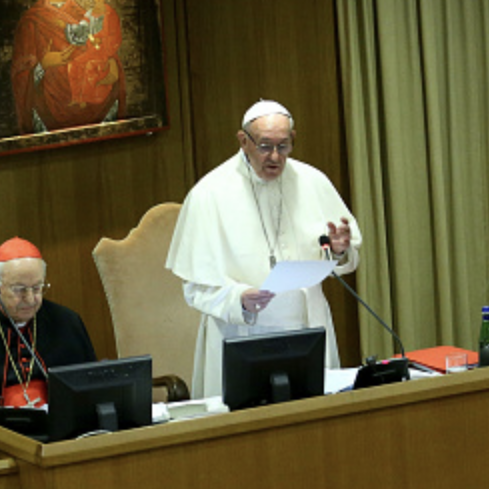Female quotas proposed as the way to rebuild trust in the Catholic Church
🔗 [SYSTEM UPDATE] Link found. Timestamp incremented on 2025-11-26 13:55:13.Introducing female quotas could help rebuild trust in the church, according to a member of the Australian Catholic Church’s Truth, Justice and Healing Council. JAMES WF ROBERTS reports

http://gty.im/1045108258
Pope Francis delivers a speech during the opening of the Synod of Bishops on Young People this week.
By JAMES WF ROBERTS
Introducing female quotas could help rebuild trust in the church, according to a member of the Australian Catholic Church’s Truth, Justice and Healing Council.
Pope Francis conceded last week that the recent onslaught of sexual abuse scandals had turned younger Catholics away from religion.
Professor Rosemary Sheehan, who is also a professor of mental health and social work at Monash University, said it was "really important that women have a significant role to play in the catholic church".

“Based on the significant party and body of the membership of the Catholic Church, many parishes and groups do involve women in significant roles in the church, but the hierarchy of the church is male only,” Prof Sheehan said.
Speaking while on tour in the Baltics last week, the pontiff said many young people were uncomfortable about engaging with the church because of “sexual and economic scandals”.
In Australia, following the Royal Commission into Institutional Responses to Child Sexual Abuse, the Truth, Justice and Healing Council last month advocated for the use of female quotas in all levels of the Church to diversify and create a more transparent culture within religious organisations.
Professor Sheehan agreed with Pope Francis’ sentiments.
“Many young people now simply do not trust the Church. Much healing needs to be done and more diversity in leadership needs to happen, if the Church is to remain relevant for young people today.”
Frank Otis, 61, gave evidence at the Royal Commission against a senior Catholic official, and has spent years dealing with the mental anguish of the abuse he suffered at the hands of that individual. Mr Otis agreed that women had an important role to play in the Catholic Church.

“I like the idea of woman taking a role in the leadership of the church. They have no role at the moment,” he said.
“I would like to see that go all the way up to the pope one day, for the Catholic Church to have its first official female pope.”
According to Prof Sheehan women are well-equipped for the job and are gaining experience due to the shortages of priests in many local parishes, which have led women to take on greater roles within the parish community.
Prof Sheehan said the current Pope was making changes as much as he could to incorporate women into decision-making structures, particularly by including key women on the board for the Pontifical Commission on Child Abuse in the Vatican, however, changing the attitudes of staunch conservatives within the Catholic Church would be difficult.
The conservative nature of the Catholic Church remains a major concern for Mr Otis.
“The problem is that they [priests] have such power. They are God's messenger and you can't question them. There needs to be a clear and easy path to take for any person who has a problem with a priest,” he said.
http://gty.im/1045098608
Protests in Rome this week against Pope Francis and the Vatican by victims of sexual abuse by clergy.
Catholics for Renewal vice-president and Catholic Coalition for Church Reform

convener Peter Johnson said despite the Catholic Church claiming to treat women fairly, it didn’t.
“Canon law clearly excludes the laity and especially women from the decision-making roles. It is quite clearly nonsense,” he said.
“The Church needs to update itself with what is going on in the world, and the only way to do that is by giving women a greater role and say in the running of the Church,” Mr Johnstone said.
Profe Sheehan also warned of the slow road ahead for institutional transformation, because the Pope must “accommodate diversity of opinion in the church hierarchy”.
“Many [opinions] are conservative and resentful to make any changes. It is a very slow change in culture, how long that might take and what it might take to make radical change I don’t know,” she said.
“Nevertheless, there are going to have to be adjustments and changes to how the hierarchy and the management of the church operates if the church is going to continue to have a role in society, and to recognise the role of women in central decision-making.”
Mr Johnstone remained quite optimistic about change in the future, acknowledging the growing voice of dissent within the church.
“The informed laity of the Catholic church no longer feel intimidated from commenting for the need for change,” he said.
“The faithful realise that when something is wrong, they need to speak up.”





